Fleurs du Mal Magazine


Or see the index

Selfie van Rogi Wieg
De tijd graaft mij in. Dit moet
een droombeeld zijn: Ik wandel
tussen rozen. Ik heb niet aan de dood
gedacht. Ik zie door glas hoe regen
neerdaalt. De avond hangt stil en ik
ben doorgelopen. Wij spreken niet
van doodgaan. Niets gaat verloren
in het ruisen, maar niemand wijst
de weg. Zo zal het einde zijn.
Wie weggaat komt ooit ergens aan.
Bert Bevers
Gedicht: Selfie van Rogi Wieg
Verschenen in In de kring van menselijke warmte – Hommage aan Rogi Wieg, samenstelling Peter de Rijk, Uitgeverij In De Knipscheer, Haarlem, 2017
Bert Bevers is a poet and writer who lives and works in Antwerp (Be)
fleursdumal.nl magazine
More in: Archive A-B, Archive A-B, Bevers, Bert, Wieg, Rogi
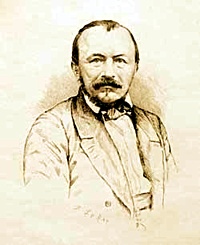
Une femme est l’amour – Poéme
Une femme est l’amour, la gloire et l’espérance;
Aux enfants qu’elle guide, à l’homme consolé.
Elle élève le cœur et calme la souffrance,
Comme un esprit des cieux sur la terre exilé.
Courbé par le travail ou par la destinée,
L’homme à sa voix s’élève et son front s’éclaircit;
Toujours impatient dans sa course bornée,
Un sourire le dompte et son cœur s’adoucit.
Dans ce siècle de fer la gloire est incertaine :
Bien longtemps à l’attendre il faut se résigner.
Mais qui n’aimerail pas. dons sa grâce sereine,
La beauté qui la donne ou qui la fait gagner?
Gérard de Nerval
(1808 – 1855)
Une femme est l’amour – Poéme
fleursdumal.nl magazine
More in: Archive M-N, Nerval, Gérard de, Nerval, Gérard de
Dieser Bestseller aus dem Jahr 1931 führt den Leser mitten hinein in die pulsierende Metropole Berlin auf dem Höhepunkt der »Goldenen Zwanziger«.
 Folgen Sie dem Autor bei seinen Ausflügen zu den Hotspots des damaligen Nachtlebens – in sagenumwobene Varietés und Tanzpaläste, in Vergnügungsparks und Kaffeehäuser, in angesagte Bars und Schwulenkneipen, aber auch an die Orte der Prostitution und des Verbrechens.
Folgen Sie dem Autor bei seinen Ausflügen zu den Hotspots des damaligen Nachtlebens – in sagenumwobene Varietés und Tanzpaläste, in Vergnügungsparks und Kaffeehäuser, in angesagte Bars und Schwulenkneipen, aber auch an die Orte der Prostitution und des Verbrechens.
Erweitere Neuausgabe des Klassikers – mit Glossar, Register und vielen historischen Fotos.
»Wer Erlebnisse sucht, Abenteuer verlangt, Sensationen sich erhofft, der wird im Schatten gehen müssen.« Curt Moreck
Curt Moreck, 1888 als Konrad Haemmerling in Köln geboren, war ein Schriftsteller und Journalist, der in den 1920er Jahren seinen Schwerpunkt auf Kultur- und Sittengeschichte legte. Während der Zeit des Nationalsozialismus war das Werk Curt Morecks verboten, nach 1945 konnte er nicht mehr an seine früheren Erfolge anknüpfen. Er starb 1957 in Berlin.
Das deutsche Babylon 1931
Curt Moreck
Ein Führer durch das lasterhafte Berlin
30 Schwarz-Weiß- Abbildungen – 2 Ktn
EAN: 9783898091497
ISBN: 389809149X
Libri: 4858158
Bebra Verlag
März 2018
208 Seiten
gebunden
€22,00
new books
fleursdumal.nl magazine
More in: - Book Lovers, - Book Stories, Archive M-N, Art & Literature News, Berber, Anita, FDM in Berlin
Forme brève, mais moins abrupte que le haïku, le quatrain ne s’en tient pas au lapidaire, il sait donner du rythme à la pensée, à l’émotion, à la surprise, il sait initier un questionnement, amorcer une méditation, esquisser un chant.
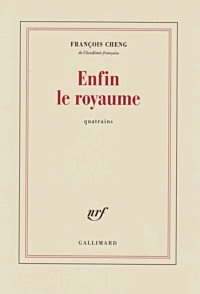 À la suite des poètes chinois des origines, mais aussi d’Omar Khayyâm et d’Emily Dickinson, François Cheng atteste ici du pouvoir singulier de ce mode d’expression resserré, pourtant si peu enclos, si ouvert aux résonances, aux errances fertiles, voire à une manière salutaire d’envoûtement simple.
À la suite des poètes chinois des origines, mais aussi d’Omar Khayyâm et d’Emily Dickinson, François Cheng atteste ici du pouvoir singulier de ce mode d’expression resserré, pourtant si peu enclos, si ouvert aux résonances, aux errances fertiles, voire à une manière salutaire d’envoûtement simple.
François Cheng (1929) de l’Académie française (2002) – Grand prix de la Francophonie de l’Académie française (2001)
François Cheng
Enfin le royaume. Quatrains
Collection Blanche, Gallimard
Parution : 08-02-2018
160 pages
140 x 205 mm
Genre : Poésie: Littérature française
Époque : XXe-XXIe siècle
ISBN : 9782072767449
Gencode : 9782072767449
Code distributeur : G01421
Prix: €15,00
new poetry François Cheng
fleursdumal.nl
More in: - Book News, - Bookstores, Archive C-D, Archive C-D, Art & Literature News, Cheng, François
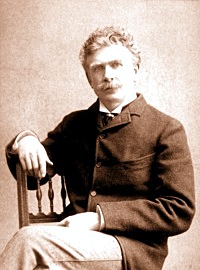
Presentiment
With saintly grace and reverent tread,
She walked among the graves with me;
Her every foot-fall seemed to be
A benediction on the dead.
The guardian spirit of the place
She seemed, and I some ghost forlorn
Surprised in the untimely morn
She made with her resplendent face.
Moved by some waywardness of will,
Three paces from the path apart
She stepped and stood — my prescient heart
Was stricken with a passing chill.
The folk-lore of the years agone
Remembering, I smiled and thought:
“Who shudders suddenly at naught,
His grave is being trod upon.”
But now I know that it was more
Than idle fancy. O, my sweet,
I did not think so little feet
Could make a buried heart so sore!
Ambrose Bierce
(1842-1914)
poetry
fleursdumal.nl magazine
More in: Archive A-B, Archive A-B, Bierce, Ambrose
Het leven van Gerbrandt Adriaensz. Bredero (1585-1618) was kort maar ongekend vruchtbaar.
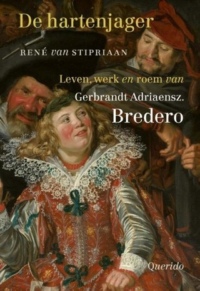 In nauwelijks acht jaar schreef hij honderden gedichten en liederen die tot de mooiste uit de Nederlandse literatuur behoren, en meer dan tien toneelstukken die nog altijd sprankelen van leven. Zijn kluchten, het blijspel Moortje en vooral de onweerstaanbare Spaanschen Brabander hebben door de eeuwen heen vele duizenden mensen onvergetelijke uren bezorgd.
In nauwelijks acht jaar schreef hij honderden gedichten en liederen die tot de mooiste uit de Nederlandse literatuur behoren, en meer dan tien toneelstukken die nog altijd sprankelen van leven. Zijn kluchten, het blijspel Moortje en vooral de onweerstaanbare Spaanschen Brabander hebben door de eeuwen heen vele duizenden mensen onvergetelijke uren bezorgd.
Wie was Bredero? Het is een van de grote vragen van de Nederlandse literatuur. Over zijn leven is weinig bekend, zijn werk is heel concreet alledaags, maar tegelijkertijd ook raadselachtig.
Hoe hield hij zich overeind in het van energie en spanning bruisende Amsterdam? In De hartenjager ontrafelt René van Stipriaan de mythen en mysteries rond een van de meest getalenteerde en vrijmoedige auteurs uit het Nederlandse taalgebied: zijn afkomst, zijn vriendschappen en liefdes, zijn enorme productiviteit en zijn plotselinge dood. Weinig is wat het lijkt.
René van Stipriaan (1959) is auteur van Het volle leven en stelde Ooggetuigen van de Gouden Eeuw en, met Geert Mak, Ooggetuigen van de wereldgeschiedenis samen. In augustus verschijnt De hartenjager, over het leven en werk van Bredero.
Auteur: René van Stipriaan
De hartenjager.
Leven, werk en roem van Gerbrandt Adriaensz. Bredero
Non-Fictie – biografie
Taal: Nederlands
Uitgever: Em. Querido’s Uitgeverij BV, Amsterdam
Publicatiedatum: 21-08-2018
ISBN 9789021409528
NUR: 321
359 pagina’s
illustraties
Met literatuuropgave, register
Prijs: € 24,99
Hardcover
new books
fleursdumal.nl magazine
More in: #Biography Archives, - Book News, - Book Stories, Archive A-B, Archive S-T, Art & Literature News, Bredero, G.A.
In Mara Bergman’s first full collection, the poet travels from the tenements of New York City to the Sussex countryside, from childhood to motherhood, and beyond.
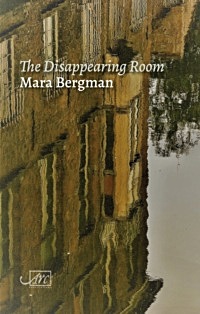 Through a wide range of subjects – steelworkers and young apprentices, photographs and photograms, dolls in a local museum’s hidden collection – she writes with a keen sense of time and place.
Through a wide range of subjects – steelworkers and young apprentices, photographs and photograms, dolls in a local museum’s hidden collection – she writes with a keen sense of time and place.
These are probing poems, seeking to discover; poems with a sense of urgency.
Here are poems about love, loss, friendship, family, fitting in and, ultimately, acceptance. They are infused with wonder and provide a fresh way of looking at the world.
Mara Bergman grew up in Wantagh, New York, and graduated from the State University of New York at Oneonta. During her third year, she studied at Goldsmiths College and later made her home in the UK. Mara’s poetry has been published widely here and abroad. Her collection The Tailor’s Three Sons and Other New York Poems won the Mslexia Poetry Pamphlet Competition and was published by Seren in 2015. In 2016, Crossing Into Tamil Nadu won a Templar Quarterly Pamphlet Competition. Her poems have been awarded prizes in the Troubadour and Kent & Sussex Poetry Society competitions, among others. Mara works in London as an editor and is also an award-winning author of more than twenty books for young children. She and her husband live in Tunbridge Wells and have three children.
The Disappearing Room
by Mara Bergman (Author)
Paperback
27 Jul 2018
92 pages
Publisher: Arc Publicationas
Language: English
ISBN-10: 1911469347
ISBN-13: 978-1911469346
Product Dimensions: 15 x 2.2 x 21 cm
£9.18
new poetry
fleursdumal.nl magazine
More in: - Book News, - Bookstores, Archive A-B, Art & Literature News

Die Einsame
Ich ziehe meine Einsamkeit um mich,
Sie ist so wie ein wärmendstes Gewand
An mir geworden ohne Kniff noch Stich,
Wenn auch der Ärmel fällt tief über meine Hand.
Ein Ungekannter hat ihr Maß gezirkt,
Die fremdes Antlitz fühlt als trübes Wehn;
Die großen Schwarzhalsschwäne sind gewirkt
In ihre Falten; aber ich nur kann sie sehn.
Es tun sich meine innren Blicke auf
– Ein Pfauenauge, das die Flügel schließt –
Und schaun der Welle jadefarbnen Lauf,
Die alte Säume licht und strömend übergießt.
Sie feuchten so wie einer Elbe Haar.
Sie tragen noch den Fluss. Sie schleppen tief.
Und graues Berggestade fängt das Jahr,
Das wie ein Vogel ängstlich seine Tage rief.
Und nun ist Schweigen, Und das Kleid schwillt nun.
Und ich muss wachsen, dass es mir noch ziemt,
Drin Fische, wie sie niemals wirklich tun,
Um meine Brüste schweben, pupurblau gekiemt.
Der Erde Körner sind hineingesät.
Aus meiner Schulter bricht ein Felsengold,
Das Tuch durchschimmernd, das sich schleift und bläht
Und langsam über meiner Stirn zusammenrollt.
Gertrud Kolmar
(1894-1943)
gedicht: Die Einsame
fleursdumal.nl magazine
More in: Archive K-L, Archive K-L, Kolmar, Gertrud
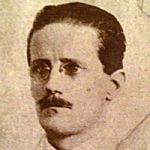
Be Not Sad
Be not sad because all men
Prefer a lying clamour before you:
Sweetheart, be at peace again — –
Can they dishonour you?
They are sadder than all tears;
Their lives ascend as a continual sigh.
Proudly answer to their tears:
As they deny, deny.
James Joyce
(1882-1941)
Be Not Sad
fleursdumal.nl magazine
More in: Archive I-J, Archive I-J, Joyce, James, Joyce, James
Elke zomer opnieuw slaat het Kunstenfestival van Watou haar tenten op in het gelijknamige kunstdorpje aan de Franse grens.

Dichters en beeldend kunstenaars, aanstormend talent en gevestigde waarden, kunstwerken uit binnen- en uit buitenland strijken er neer en vormen een bijzonder kunstenparcours. Het dorp is de setting en biedt een tiental karakteristieke locaties als tentoonstellingsruimte: een voormalig klooster, een oude boerderij of de kelder van een brouwerij. De wisselwerking tussen die verrassende, nostalgische ruimtes met hedendaagse beeldende kunst en poëzie zorgt telkens weer voor een unieke kunstbeleving. Zomeren in Watou is dan ook prikkelen en onthaasten tegelijk. Kleine momenten van gelukzaligheid.
Iedere editie van het Kunstenfestival kadert in een ander thema, waarrond intendant Jan Moeyaert en poëziecurator Willy Tibergien beeld en taal samenbrengen. Schrijvers, dichters en kunstenaars palmen gedurende een zomer het dorp in en bieden de bezoekers een caleidoscoop aan inzichten en perspectieven rond een bepaald onderwerp.
De afgelopen edities van Kunstenfestival Watou groeide er gestaag een nieuwe poëtische lijn in het dorp. Ook dit jaar selecteerde poëziecurator Willy Tibergien gedichten van gevestigde waarden in het Nederlandstalig poëzielandschap om hen een permanente plaats te geven in Watou.
Aan het werk van Eddy van Vliet, Paul Snoek, Remco Campert, Hugues C. Pernath, Jean-Claude Pirotte, Leo Vroman, Miriam Van hee, Stefan Hertmans, Gerrit Kouwenaar en Marc Insingel, Leonard Nolens, Christine D’Haen, Joost Zwagerman, Jotie T’Hooft, Charles Ducal en Luuk Gruwez worden dit jaar gedichten van Anna Enquist, Eva Gerlach en Frans Deschoemaeker toegevoegd.
STRING CARPET – GIDEON KIEFER – KUNSTENAARSGESPREK – ZONZO COMPAGNIE – ELS DEJONGHE – HET VLIEGEND TAPIJT – VRIJDAG VIERT FEEST – KRISTIN VERELLEN – POSTKANTOOR 00/00/00 – LIZE PEDE – BERNARD DEWULF – ALICJA GESCINSKA – DE TROOSTWINKEL – DOWN TIGER DOWN – SIEL EN LARISSA – NELLY AGASSI – IK ZIE MENSEN – POËZIE POËZIE POËZIE – DEREK & RENAUD – WIM CHIELENS – DE PLUIZENTUIN – WALLY DEDONCKER – ANT AND … – IK BEN WEER VELEN – STEPHANIE STRUIJK – BERNARD DEWULF – MENNO WIGMAN – GRAHAM FAGEN – GERRIT KOUWENAAR – FRANS DESCHOEMAEKER – ANNA ENQUIST – EVA GERLACH – FRAUKE WILKEN – SAM DURANT – SIGRID VON LINTIG – PAUL SNOEK – MAUD BEKAERT -PETER VERHELST- DENIS VERCRUYSSE – MOHAMED EL BAZ – PARSE/ERROR – KATRIN DEKONINCK – ARPAÏS DU BOIS – GRZEGORZ GWIAZDA – SHIMABUKU – PETER DE MEYER – ROBINE CLIGNETT – ELS LESAGE – RADNA FABIAS – RY ROCKLEN – CHAIM VAN LUIT – SYLVIA EVERS – TORI WRÅNES – RONNY DELRUE – PETER MORRENS – HERVÉ MARTIJN – THÉ VANBERGEN – HANNE VAN ROMPAEY – STEFAN HERTMANS – TOM VAN DEEL – DANIELLE VAN ZADELHOFF – ANTON COTTELEER – SU-MEI TSE – POLIEN BOONS – JONAS VANSTEENKISTE – GURT SWANENBERG – ARANTHELL – GEERTJE VANGENECHTEN – MAARTEN VANDEN EYNDE – DOMINIQUE DE GROEN – JANI LEINONEN – JOSÉ COBO – TATJANA GERHARD – NADIA NAVEAU – HESTER KNIBBE – LUK VAN SOOM – JEROEN VAN KAN – CAROL ANN DUFFY – IRINA RATUSHINSKAYA – YEHUDA AMICHAI – NIDAA KHOURY – ZIYA MOHAVED – HANS OP DE BEECK- MASSIMO UBERTI -VAJIKO CHACHKHIANI – MOYA DE FEYTER – SHEILA HICKSEMMA VAN ROEY – BERNARDÍ ROIG -PETER THEUNYNCK – GIDEON KIEFER – EDITH DEKYNDT – THOMAS LEROOY – RANDALL CASAER- CHRISTINA MIGNOLET – GERD KANZ- GREET DESAL – HANNAH VAN BINSBERGEN – MELIK OHANIAN – JOHAN CLARYSSE – SOPHIE BOUVIER AUSLÄNDER – HANS DEFER- LUDOVIC LAFFINEUR – ARNE QUINZE – MARIJE LANGELAAR – TANYA SCHULTZ – ERLEND VAN LANDEGHEM – ROLAND JOORIS – LUKA FINEISEN – MEKHITAR GARABEDIAN – FRANZ SCHMIDT – CLARISSE BRUYNBROECK – FRANCIS PONGE – DAVID DE POOTER – RUTGER KOPLAND – JAN VANRIET – HUGO CLAUS – NELLY AGASSI – K. MICHEL – MICHAL MARTYCHOWIEC – PAUL DEMETS – STEPHAN MUIS – SAMMY BALOJI – TANG NANNAN – ADEL ABDESSEMED – LAURENS HAM – TODD ROBINSON – PANAMARENKO – GILLES BARBIER – HELEN DUNMORE – CASPER BRAAT – SYLVIE MARIE – CHANTAL POLLIER – EZRA VELDHUIS – HARLINDE DE MOL – ELEANOR CROOK – ANNO DIJKSTRA
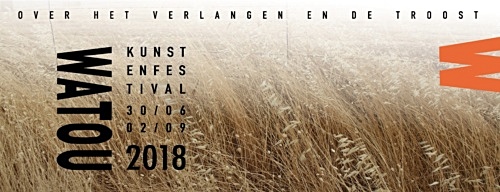
Kunstenfestival Watou 2018 loopt nog tot en met 2 september
Open: woensdag tot zondag van 11u tot 19u – maandag en dinsdag gesloten, behalve op feestdagen
Adres:
Watouplein 12
8978 Watou
Poperinge (België)
De start van het Kunstenfestival is te vinden in het Festivalhuis (Watouplein 12), op het marktplein naast de Spar. Opg elet! Voor alle weekend-events zijn de plaatsen beperkt. Een plaats reserveren kan enkel de dag zelf aan de kassa, bij aankoop van uw ticket.
# meer informatie op website kunstenfestival Watou
Kunstenfestival Watou 2018
fleursdumal.nl magazine
More in: # Music Archive, #Editors Choice Archiv, #More Poetry Archives, - Book Lovers, - Book Stories, Art & Literature News, Exhibition Archive, FDM Art Gallery, LITERARY MAGAZINES, PRESS & PUBLISHING, STREET POETRY, THEATRE, Watou Kunstenfestival
In this intimate and vital debut, Richard Scott creates an uncompromising portrait of love and gay shame.
 Examining how trauma becomes a part of the language we use, Scott takes us back to our roots: childhood incidents, the violence our scars betray, forgotten forebears and histories. The hungers of sexual encounters are underscored by the risks that threaten when we give ourselves to or accept another. But the poems celebrate joy and tenderness, too, as in a sequence re-imagining the love poetry of Verlaine.
Examining how trauma becomes a part of the language we use, Scott takes us back to our roots: childhood incidents, the violence our scars betray, forgotten forebears and histories. The hungers of sexual encounters are underscored by the risks that threaten when we give ourselves to or accept another. But the poems celebrate joy and tenderness, too, as in a sequence re-imagining the love poetry of Verlaine.
The collection crescendos to Scott’s tour de force, ‘Oh My Soho!’, where a night stroll under the street lamps of Soho Square becomes a search for true lineage, a reclamation of stolen ancestors, hope for healing, and, above all, the finding of our truest selves.
Richard Scott grew up in London and studied at the Royal College of Music and at Goldsmiths College. He has been a winner of the Wasafiri New Writing Prize, a Jerwood/Arvon Poetry mentee, a member of the Aldeburgh 8 and an Open Spaces artist resident at Snape Maltings in Suffolk. His pamphlet Wound (Rialto) won the Michael Marks Poetry Award 2016 and his poem ‘crocodile’ won the 2017 Poetry London Competition.
Scott was born in London in 1981. His poems have appeared widely in magazines and anthologies including Poetry Review, Poetry London, Swimmers, The Poetry of Sex (Penguin) and Butt Magazine. He has been a winner of the Wasafiri New Writing Prize, a Jerwood/Arvon Poetry Mentee and a member of the Aldeburgh 8. His pamphlet Wound, published by Rialto, won the Michael Marks Poetry Award 2016. His debut collection is forthcoming from Faber & Faber in 2018.
Soho
Richard Scott
£10.99
Paperback
88 pages
Publisher: Faber & Faber
Main edition
5 April 2018
Language: English
ISBN-10: 0571338917
ISBN-13: 978-0571338917
new poetry
fleursdumal.nl magazine
More in: - Book News, - Bookstores, Archive S-T, Art & Literature News
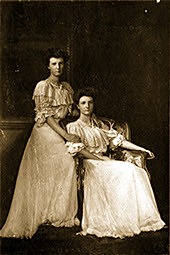
Preparation
A time will come when I shall breathe
New melodies to soothe and fold,
Like portions of a mellow sheath,
My sorrow. While my songs withhold
Their tones, I pause before the years;
I gaze on the grey world ; I strive
To clear the mist of doubting tears.
My songs, what music you ll derive
From silence in the time to come!
Gladys Cromwell
(1885-1919)
Preparation
fleursdumal.nl magazine
More in: Archive C-D, Cromwell, Gladys, Gladys Cromwell
Thank you for reading Fleurs du Mal - magazine for art & literature